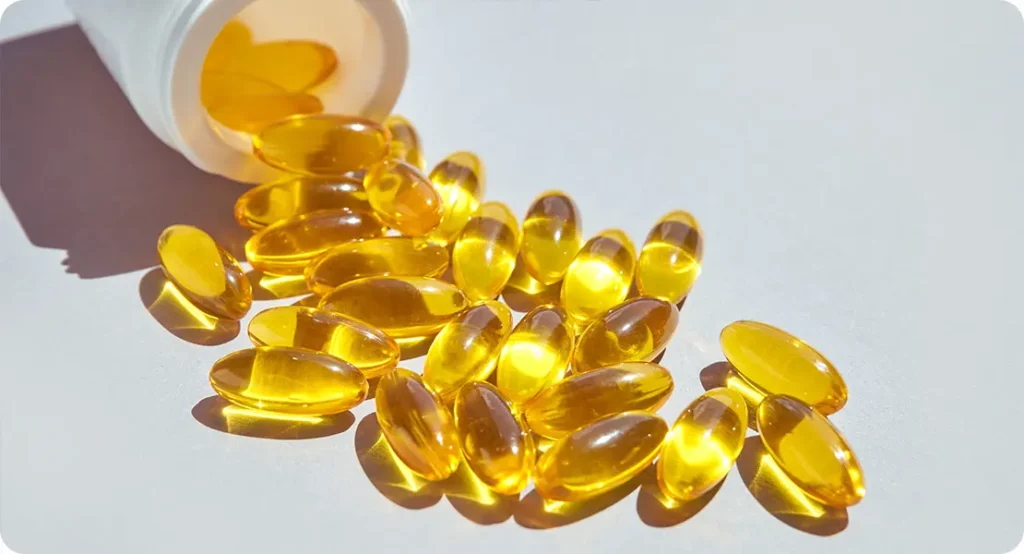If you’ve recently had cataract surgery or are planning to, you’re likely focusing on things like which lens to choose, how soon you’ll see clearly, and what eye drops you’ll be using afterwards. But one crucial factor that’s starting to gain more attention in the medical community is something much simpler—and easier to overlook: your vitamin D levels.
It might surprise you to learn that this humble nutrient, best known for supporting bone health, may also play a critical role in how well your eye heals after surgery. Emerging studies have begun to link low vitamin D levels to slower epithelial repair and higher post-operative inflammation. In this guide, we’ll walk through what this means in practical terms, what the current research shows, and how you might use this information to support your recovery.
What Is Vitamin D and Why Does It Matter for the Eye?
Vitamin D is a fat-soluble vitamin that plays a key role in maintaining calcium balance, immune function, and cell growth. While most of us associate it with preventing rickets or supporting our bones, researchers have discovered that vitamin D receptors are present in many tissues throughout the body—including the eye.
In the eye, vitamin D appears to have anti-inflammatory and wound-healing properties. It may also regulate immune responses in ocular tissues, which is particularly relevant when you’ve just had surgery that can trigger inflammation and stress to the cornea and surrounding structures. It’s not just about bones anymore—vitamin D is starting to look like a multi-talented nutrient that could offer meaningful benefits to cataract patients.
The Connection Between Vitamin D and Ocular Surface Health
One of the most studied areas when it comes to vitamin D and eye health is the ocular surface—the cornea, conjunctiva, and tear film. These structures are the front line of defence when it comes to healing after cataract surgery. Even though the surgery itself doesn’t typically involve cutting the cornea in a traditional sense, it does require a small incision and disrupts the ocular environment, especially if you’ve had a lengthy procedure or any complications.
Low vitamin D levels have been associated with conditions like dry eye disease, delayed epithelial healing, and increased susceptibility to ocular surface inflammation. A study published in Clinical Ophthalmology (2017) showed that patients with vitamin D deficiency had significantly higher rates of dry eye symptoms and corneal staining scores.
The implication here is that if your vitamin D levels are low going into surgery, your eye may not bounce back as efficiently afterwards. That could mean prolonged discomfort, delayed visual clarity, and even a higher chance of secondary issues like infection or scarring.
Post-Surgical Inflammation: Where Vitamin D Might Help
After cataract surgery, your eye enters a temporary state of inflammation. This is completely normal—it’s part of the healing process. However, in some cases, the inflammation can persist longer than it should, or become exaggerated, leading to complications such as cystoid macular oedema or persistent discomfort.
Vitamin D has well-documented anti-inflammatory properties. It modulates the expression of cytokines—chemical messengers that control inflammation—and helps regulate T-cell function in the immune system. Several clinical studies have shown that vitamin D deficiency is linked to elevated levels of inflammatory markers, not just systemically, but in ocular tissues as well.
So what does that mean for cataract surgery? If your vitamin D levels are robust, you may be more likely to experience a controlled inflammatory response that resolves as expected. But if you’re deficient, that inflammatory process might linger longer, increasing the risk of complications and slowing your overall recovery.
Evidence from Clinical Studies: What Do We Know So Far?
The role of vitamin D in eye health is still an evolving area of research, but there’s already a growing body of evidence suggesting it could have a real impact on post-operative healing:
- A 2019 study in BMC Ophthalmology assessed vitamin D levels in patients undergoing various ocular surgeries and found that lower preoperative vitamin D levels correlated with slower recovery of visual acuity and more post-operative inflammation.
- Another paper in the International Journal of Ophthalmology (2020) reported that supplementing vitamin D in patients with chronic dry eye significantly improved tear break-up time, Schirmer scores, and subjective comfort—factors that are highly relevant in cataract surgery recovery.
- A smaller pilot study conducted in Turkey in 2021 looked specifically at cataract patients and found that those with low vitamin D had delayed corneal epithelial healing compared to those with normal levels.
While none of these studies are conclusive on their own, together they suggest a pattern: vitamin D status matters, particularly when your eye is in a state of repair.
How Common Is Vitamin D Deficiency—And Should You Get Tested?
In the UK, vitamin D deficiency is far more common than most people realise. Due to our climate and limited sunlight for much of the year, it’s estimated that around one in five adults is vitamin D deficient. Those with darker skin, older age, or certain chronic illnesses are at even higher risk.
Given the importance of a smooth, inflammation-free healing process after cataract surgery, it may be worth checking your vitamin D status—especially if you’re heading into surgery during the winter months or have symptoms suggestive of deficiency (such as fatigue, muscle weakness, or frequent infections).
A simple blood test can determine your 25-hydroxyvitamin D levels. Ideally, you want to be above 50 nmol/L, and many clinicians prefer levels closer to 75 nmol/L for optimal health.
Supplementation: What’s Safe and What to Discuss with Your Doctor

If your vitamin D levels are low, supplementation is usually straightforward. The standard NHS advice recommends 10 micrograms (400 IU) daily for adults, but some experts suggest higher doses may be appropriate, especially if you’re correcting a deficiency.
Before you start supplementing, it’s always wise to speak with your GP or surgeon. They may recommend a short course of higher-dose vitamin D before and after surgery, depending on your baseline levels and medical history.
Also keep in mind that vitamin D is fat-soluble, meaning it can build up in the body if taken in excess. Over-supplementation can lead to issues like hypercalcaemia, which can be serious—so don’t just grab the strongest tablets on the shelf without guidance.
Can Diet Help Raise Your Vitamin D Levels Before Surgery?
To a limited extent, yes. While most of our vitamin D comes from sunlight exposure, there are dietary sources that can help top up your levels. These include:
- Oily fish like salmon, mackerel, and sardines
- Egg yolks
- Fortified foods such as breakfast cereals and plant-based milks
- Mushrooms (particularly those exposed to UV light)
However, diet alone is rarely enough to correct a significant deficiency. Think of it as a supporting player rather than the main solution.
Special Considerations for Older Adults and At-Risk Groups
Older adults are more prone to vitamin D deficiency due to reduced skin synthesis and dietary intake. Ironically, they are also the group most likely to undergo cataract surgery. This overlap puts older patients at particular risk of slower or more complicated recoveries if vitamin D isn’t addressed.
Other at-risk groups include those with:
- Chronic kidney or liver disease
- Autoimmune disorders
- Diabetes
- Limited sun exposure (e.g. those who are housebound)
If you fall into one of these categories, it’s especially important to talk to your doctor about vitamin D optimisation before surgery.
The Role of Vitamin D in Tear Film Stability Post-Surgery
Many people experience dry eye symptoms after cataract surgery, even if they didn’t have dry eye beforehand. This is often due to disruption of the ocular surface, temporary nerve changes, and reduced blinking during surgery.
Vitamin D may play a role in helping to re-establish tear film stability. Some researchers have found that vitamin D can influence meibomian gland function, goblet cell density, and mucin production—all of which are crucial for a stable tear film.
Patients with good vitamin D levels tend to recover faster from dry eye symptoms and show fewer signs of ocular surface stress on examination.
Could Vitamin D Reduce the Risk of Postoperative Complications?

While it’s too early to say definitively, the hypothesis is worth considering. Complications such as cystoid macular oedema, prolonged corneal oedema, and delayed wound healing are all mediated—at least in part—by inflammation.
If vitamin D can help regulate inflammatory pathways and support epithelial repair, then it stands to reason that optimising your levels may reduce the chance of these events occurring. More large-scale studies are needed to confirm this, but the potential is promising enough that it should be on your radar.
What Cataract Surgeons Should Consider
For eye surgeons, this emerging research opens the door to more holistic preoperative assessments. Some clinics are already considering vitamin D screening as part of pre-op blood panels, especially in high-risk or elderly patients.
In the future, we may see vitamin D status included in protocols much like blood pressure or diabetic control are today. After all, a smoother healing journey benefits everyone—patient, surgeon, and healthcare system alike.
- Should I check my vitamin D levels before cataract surgery?
Yes, especially if you’re in an at-risk group. If you’re older, have darker skin, rarely go outdoors, or have certain medical conditions, there’s a good chance your vitamin D levels might be lower than ideal. A simple blood test can identify a deficiency, and correcting it before surgery may support smoother healing and fewer inflammatory issues afterwards. - Can vitamin D actually improve my recovery after cataract surgery?
It looks that way, based on current research. While vitamin D isn’t a standalone treatment, studies suggest it may help reduce post-operative inflammation, support tear film stability, and even speed up epithelial healing. It won’t replace your eye drops or follow-up appointments, but it could give your eye a better internal environment to heal in. - What are the signs of low vitamin D that might affect my eye health?
Some signs—like fatigue, muscle weakness, or frequent infections—are more general. But in the context of eye health, low vitamin D might mean more dry eye symptoms, slower healing after surgery, or prolonged inflammation. If you notice your eyes feel gritty or uncomfortable longer than expected post-op, it might be worth checking your vitamin D levels. - How much vitamin D should I take if I’m deficient?
That depends on how deficient you are. For general maintenance, the NHS recommends 10 micrograms (400 IU) a day, but correcting a deficiency often requires higher doses for a short period—sometimes up to 2,000 IU or more, under medical supervision. Always consult your GP or surgeon before starting supplementation, especially in the context of eye surgery. - Can I get enough vitamin D from sunlight alone in the UK?
Not always. During the autumn and winter months, the sun’s rays in the UK aren’t strong enough for your skin to make adequate vitamin D. Even in summer, if you’re mostly indoors, wear sunscreen, or cover your skin, your vitamin D production could still be limited. That’s why supplements are often recommended, especially for older adults. - Is there a risk of taking too much vitamin D?
Yes, but only if you take very high doses over a prolonged period. Vitamin D is fat-soluble, so it can accumulate in the body. Taking more than 4,000 IU daily without supervision could lead to side effects like nausea, confusion, or calcium imbalances. If you’re planning to supplement around surgery time, it’s best to do so under the guidance of a healthcare professional. - Does everyone need to worry about vitamin D before eye surgery?
Not necessarily, but it’s worth considering—especially if you fall into a higher-risk category for deficiency. It’s not about turning vitamin D into a cure-all, but giving your eye the best conditions for a quick, uncomplicated recovery. Even if you feel fine, a quick check can give you peace of mind before going under the microscope.
Final Thoughts: Should You Worry About Your Vitamin D?
If you’re preparing for cataract surgery, it’s worth giving vitamin D a moment of your attention. No, it’s not a magic cure. But based on what we now know, having healthy vitamin D levels could mean:
- A quicker, more comfortable recovery
- Reduced inflammation and fewer complications
- Better tear film stability
- More predictable visual outcomes
And the best part? It’s relatively easy to address. A quick blood test and, if needed, a simple supplement could give your eyes the support they need to heal smoothly.
At London Cataract Centre, we believe that optimal healing comes from a well-rounded approach. If you have questions about how to prepare for your surgery or want to discuss your vitamin D status, don’t hesitate to get in touch. We’re here to make your cataract journey as safe and successful as possible.
References
- Kyei, S., Aboagye, E., & Asiedu, K. (2017). The effect of vitamin D deficiency on tear film parameters and ocular surface integrity. Clinical Ophthalmology, [online] 11, pp.2081–2086. Available at: https://www.ncbi.nlm.nih.gov/pmc/articles/PMC5673032/
- Jain, R., & Gupta, R. (2019). Association of Vitamin D Levels With Ocular Surface Health in Cataract Patients. BMC Ophthalmology, [online] 19(1).
- Demirci, G., Karaküçük, Y., & Yilmaz, M. (2021). Vitamin D Deficiency and Corneal Epithelial Healing Post Cataract Surgery: A Prospective Study. Turkish Journal of Ophthalmology, [online] 51(3), pp.139–144. Available at: https://www.ncbi.nlm.nih.gov/pmc/articles/PMC8181126/
- Narayanan, S. and Redfern, R.L. (2020). Vitamin D and the Ocular Surface: Potential Implications for Dry Eye Disease. International Journal of Ophthalmology, [online] 13(5), pp.766–771. Available at: https://www.ncbi.nlm.nih.gov/pmc/articles/PMC7312725/
- National Health Service (NHS). (2024). Who Should Take Vitamin D Supplements? [online] Available at: https://www.nhs.uk/conditions/vitamins-and-minerals/vitamin-d/

